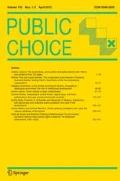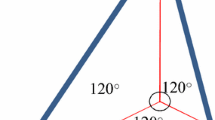Abstract
This paper examines the implications for social welfare functions of restricting the domain of individual preferences to type-one preferences. Type-one preferences assume that each person has a most preferred alternative in a euclidean space and that alternatives are ranked according to their euclidean distance from this point. The result is that if we impose Arrow's conditions of collective rationality, IIA, and the Pareto principle on the social welfare function, then it must be dictatorial. This result may not seem surprising, but it stands in marked contrast to the problem considered by Gibbard and Satterthwaite of finding a social-choice function. With unrestricted domain, under the Gibbard-Satterthwaite hypotheses, choices must be dictatorial. With type-one preferences this result has been previously shown not to be true. This finding identifies a significant difference between the Arrow and Gibbard-Satterthwaite problems.
Similar content being viewed by others
REFERENCES
Arrow, K.J. (1963). Social choice and individual values. 2nd ed. New Haven: Yale University Press.
Black, D.J. (1948). The decision of a committee using a special majority. Econometrica 16: 245–261.
Border, K.C. (1983). Social welfare functions for economic environments with and without the pareto principle. Journal of Economic Theory 29: 205–216.
Border, K.C., and Jordan, J.S. (1982). Straightforward Elections, Unanimity and Phanton Voters. Review of Economic Studies 50: 153–170.
Enelow, J.M., and Hinich, M.J. (1983). On Plott's pairwise symmetry condition for majority rule equilibrium. Public Choice 40: 317–321.
Fishburn, P.C. (1970). Arrow's impossibility theorem: Concise proof and infinite voters. Journal of Economic Theory 2: 103–106.
Gibbard, A. (1973). Manipulation of voting schemes: A general result. Econometrica 41: 587–601.
Hansson, B. (1976). The existence of group preference functions. Public Choice 28: 89–98.
Kalai, E., and Muller, E. (1977). Characterization of domains admitting nondictatorial social welfare functions and nonmanipulable voting procedures. Journal of Economic Theory 16: 457–469.
Kalai, E., Muller, E., and Satterthwaite, M. (1979). Social welfare functions when preferences are convex, strictly monotonic, and continuous. Public Choice 34: 87–97.
Kirman, A., and Sondermann, D. (1972). Arrow's theorem, many agents and invisible dictators. Journal of Economic Theory 5: 267–277.
Kramer, G. (1973). On a class of equilibrium conditions for majority rule. Econometrica 41: 285–297.
Laffond, G. (1980). Revelation des preferences et utilités unimodales. Working Paper, Laboratoire d'econometrie du CNAM.
Maskin, E. (1976). Social welfare functions for economics. Cambridge and Harvard University, mimeographed.
McKelvey, R. (1979). General conditions for global intransitivities in formal voting models. Econometrica 47: 1085–1112.
Plott, C.R. (1967). A notion of equilibrium and its possibility under majority rule. American Economic Review 57: 787–806.
Riker, W., and Ordeshook, P. (1973). Introduction to positive political theory. Englewood Cliffs, N.J.: Prentice-Hall.
Satterthwaite, M.A. (1975). Strategy-proofness and Arrow's conditions: Existence and correspondence theorems for voting procedures and social welfare functions. Journal of Economic Theory 10: 187–217.
Author information
Authors and Affiliations
Rights and permissions
About this article
Cite this article
Border, K.C. An impossibility theorem for spatial models. Public Choice 43, 293–305 (1984). https://doi.org/10.1007/BF00118938
Published:
Issue Date:
DOI: https://doi.org/10.1007/BF00118938




